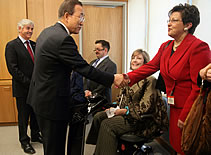Act Now

Empower U: Learn to Access Your Disability Rights Training on Canadian Human Rights, the Convention on the Rights of Persons with Disabilities (CRPD) and its Optional Protocol (OP) training aims to increase awareness of how to address discrimination using more familiar Canadian human rights laws such as Human Rights Codes and the newer international Convention on the Rights of Persons with Disabilities (CRPD). This is training for persons with disabilities by persons with disabilities. The training is part of a project funded by Employment and Social Development Canada and implemented by the Council of Canadians with Disabilities (CCD) in collaboration with Canadian Multicultural Disability Centre Inc. (CMDCI), Citizens With Disabilities – Ontario (CWDO), Manitoba League of Persons with Disabilities (MLPD) and National Educational Association of Disabled Students (NEADS). Read more.
Sign Up for our monthly digest
A monthly newsletter from CCD about what is happening in the community
How Can a Civil Society Shadow Report Improve Accountability?
Related Documents
December 3, 2023
Opinion: It's time we made room for people with disabilities
December 3, 2023
International Day of Persons with Disabilities 2023
June 6, 2023
UN Conference of State Parties: Connecting Disability Organizations
Examining Canada’s Human Rights Obligations under the Convention on the Rights of Persons with Disabilities (CRPD): How Can a Civil Society Shadow Report Improve Accountability?
On Thursday 14 February 2013, at the Munk School of Global Affairs, Steve Estey, Chair of CCD’s International Committee, participated in a panel presentation along with David Shannon (Nova Scotia Human Rights Commission) and Penny Hartin (World Blind Union). Steve reviewed CCD’s recommendations to the Government of Canada regarding the CRPD.
CCD has called upon the Government of Canada to design a National Action Plan, for successful implementation of the CRPD. CCD has recommended that a detailed implementation action plan would identify necessary mechanisms for collaboration, benchmarks for monitoring and reporting, and strategies for priority areas for action the disability community has identified, including: access to disability supports, poverty alleviation, labour force participation, accessibility and inclusion and international leadership by Canada on disability issues. Through shadow reports the disability community will have the opportunity to share its perspective on both Canadian successes in advancing the status of Canadians with disabilities while at the same time acknowledge the gaps and barriers that remain.

Canadian Foreign Minister Lawrence Cannon, far left, observes as U.N. Secretary-General Ban Ki-moon, second from left, meets members of the Canadian delegation including Steven Estey, center, with the Council of Canadians with Disabilities; Traci Walters, second from right, with Independent Living Canada; and the Canadian Association for Community Living President Bendina Miller, far right, at the United Nations in New York, Thursday March 11, 2010. Canada ratified the U.N. Convention on the Rights of Persons with Disabilities, a historic first international treaty that comprehensively recognizes the rights of persons with disabilities. (AP Photo/Bebeto Matthews)
